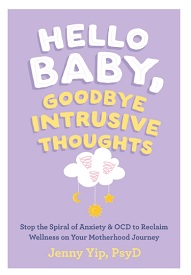
 With over two
decades of experience as a board-certified, licensed psychologist, Dr. Jenny Yip has become a
nationally recognized expert in behavioral and cognitive psychology.
Shaped by personal experience and professional expertise, Dr. Yip's
approach makes her a trusted figure in the realms of OCD, anxiety,
and parenting stress.
With over two
decades of experience as a board-certified, licensed psychologist, Dr. Jenny Yip has become a
nationally recognized expert in behavioral and cognitive psychology.
Shaped by personal experience and professional expertise, Dr. Yip's
approach makes her a trusted figure in the realms of OCD, anxiety,
and parenting stress.
Her dedication extends beyond her office; Dr. Yip is a prolific author and engaging speaker, sharing her insights and advice through her books, including her latest, Hello Baby, Goodbye Intrusive Thoughts, as well as through her podcast, The Stress-Less Life.
We spoke with Dr. Yip about improving mental well-being, mindfulness and reducing anxiety.
___________________________
Are there particular mental health
issues that seem to impact the AAPI community more than others?
Anxiety is one of the most common mental health conditions to affect
all Americans, that doesn't exclude any race, ethnicity, or gender.
Asians are included in that, but I would say that one of the big
problems that we see is that in Asian culture, there's a lot of
stigma around mental health, so it's not spoken about. Therefore,
even though you might not recognize it and you might minimize a lot
of the symptoms, it still affects Asians just the same.
In a lot of Asian cultures, it's not a big deal to be anxious. A lot
of symptoms are minimized. But in Asian culture, I would say that a
lot of the symptoms come out somatically. Within the Asian
population, instead of saying that I'm sad and anxious, it comes out
in physical symptoms. In the Asian population, somatoform
disorders are actually more prevalent. It's more accepted to
have a physical symptom than it is to have an emotional or mental
health symptom. But nevertheless, that doesn't mean that anxiety or
depression isn't underlying the physical symptoms. Our mind and body
are connected, so your mental health symptoms are going to come out
one way or another. For a lot of Asians, it comes out in physical
form.
Anxiety seems to be at an all-time high for just about
everyone, whether it’s school-, family- or work-related. At what
point should someone seek professional help?
When it interferes with your functioning, family life, your ability
to attend to work or school, or if you find that you're more
isolated or socially withdrawn because of anxiety then it's time to
seek professional help. If it's interrupting your sleep, eating
habits, focus and attention, and your enjoyment of previously
enjoyable activities, then it's time to seek help.
 Raising
children is rewarding, but also stressful. How can parents keep
their own anxiety in check while parenting?
Raising
children is rewarding, but also stressful. How can parents keep
their own anxiety in check while parenting?
Your children are always watching you. As parents, we are role
models to our children. We have to realize that our biggest job as
parents is to prepare our children for real life.
Recognize that you have to determine what are your values, as a
parent, to instill in your children. As a mother myself, I
constantly have to check in with myself: Am I role-modeling those
values to my own children? Whether it's kindness, compassion, or
being resilient. I have to role model self-care to my children, too.
I don't want my children to be workaholics or to have unhealthy
behaviors. It's taking time to reflect on what your values are as a
person, as a parent, as a family, and just recognizing and being
aware that your children are always watching. Are you role modeling
what you want to instill?
Anxiety can come out in all sorts of ways. If you tend to be intense
about certain things, your children will know. Children are so
perceptive; they'll notice everything.
On the other hand, you don't want your children to see you as a
robot. You want your children to see you deal with life's challenges
in a healthy way. When you're anxious, you can let your children
know: "There's something that I'm just a little worried about, and
I'm going to take care of it. I just need some time to figure it
out. I need to use my tools and go and take a walk."
Whatever it is that you do to manage your anxiety, it's okay to
share with your children, because then you're telling them, "I don't
have to be stuck when I'm feeling a certain way. I can also develop
tools to manage uncomfortable situations."
You have to learn how to have firm emotional boundaries. Your
emotions are your emotions. You don't have to let that spill over to
your children, but you also can show your children that you have
ways to manage your uncomfortable emotions, because we will all
experience uncomfortable emotions.
Is there a difference between emotional and mental health?
Mental health is going to translate into emotional health. They are
very much aligned together. Your mental health will influence your
emotional health, which will influence your physical health.
You have to have strong mental health, so that you can be
emotionally healthy as well as physically healthy. If you don't have
your mental wellness, you are not going to be well emotionally, and
it's going to come out in physical ailments.
What are some things that we can do to improve our mental
state?
1) Awareness: taking time to reflect on what's happening in our
lives, and if there are some things that we are bothered by.
2) Recognizing what triggers our unwellness.
3) Problem solving for those triggers, which might include finding
professional help when we're having trouble problem solving.
4) Avoid avoidance: If we're avoiding, three things are happening.
First, the source of our avoidance becomes more powerful. Second, we
never get the corrective feedback that we actually have what it
takes to handle this problem. Third, avoidance doesn't solve any
problem, and in fact, it will create a bigger problem.
Whatever the source of avoidance is, if we're avoiding it, it's just
going to magnify and become more problematic. So, avoid avoidance
for those three reasons.
How do you reset after a stressful day?
It depends on what my source of the stressor is. If it's my
children, one of the ways that I reset is look at their baby videos.
As a mother, I have to remember why I had children, remember my
connection with them, and how I genuinely feel about my children. I
go back to the times when they couldn't talk back to me, when they
needed me, and they were my world. I go back to my baby videos and
photos to remind myself of the bond that I had with them.
I have to remember to set healthy, emotional and mental boundaries
with them and with myself as a mother, which you can find in my book.
If it's a work stressor, I still have to set healthy, emotional, and
mental boundaries. When I go home, I have to shift my mindset away
from work. It's a practice. You have to turn off that part of your
brain. It's like practicing to shut your laptop down or turning off
your phone when you're with your family. It's hard to do, but it
takes practice and you have to work on that.
It's also mindfulness; being mindful about where you are, who you're
with, what environment you're in. If I am completely present with my
family, then I cannot also be present at work. It's a mental shift.
If I'm really worried about something at work, I do a worry time.
Take 15 minutes and write your worry statements by hand -- not
typing, writing. You're tiring your worried brain out, and you're
putting your worries on paper so that you can reflect back on it.
When you're ruminating, it's like a runaway train. There's no
beginning or end. When you're doing worry statements, you're
literally making stops along the way because you can only write so
fast.
____________
Cover photo and photo by Justin Edwards

